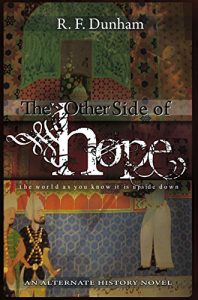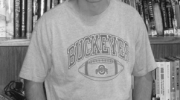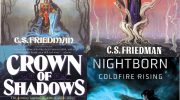 If you guys haven’t figured it out by now, I love talking to alternate historians. Today’s subject is RF Dunham whose novel, The Other Side of Hope, came out last April. Learn more about RF, his new novel, the Battle of Tours and more in the interview below.
If you guys haven’t figured it out by now, I love talking to alternate historians. Today’s subject is RF Dunham whose novel, The Other Side of Hope, came out last April. Learn more about RF, his new novel, the Battle of Tours and more in the interview below.
Welcome to SFFWorld, RF Dunham. Please tell us a little about yourself.
Thanks for having me! I’m a long time fan (and writer) of all types of speculative fiction, though I’m focused on alternate history and fantasy right now. My big focus other than writing is music. I play the trumpet and keyboard in a low-key, post rock band and help out with the band program at a high school in my area. I live in Central Virginia, which is an absolutely beautiful place and I love getting out to hike in the mountains and foothills.
Now I know RF Dunham isn’t your real name and, if you don’t mind me asking, why do you use a pen name?
I don’t mind the question at all! I wanted the anonymity of it in order to not necessarily mix the writing side of my life with other things that I’m involved in. It is a tad inconvenient sometimes, but I’m still happy with the decision. There’s also some fun symbolism built into the name. I choose “Dunham” only because it’s similar to my real last name and I like the sound of it. For the initials, I used the first names of my two grandfathers: Robert and Frederick.
What got you interested in alternate history?
I feel almost like alternate history got interested in me. Just a few years ago, I didn’t know much about the genre at all beyond the stereotypical scenarios like the Nazis winning WWII or the South winning the Civil War. I started getting more into it once I began planning The Other Side of Hope. I discovered pretty quickly that the way I wanted to build that world was by changing an event in history, specifically the Battle of Tours. Once I realized that I was writing an alternate history, I started to get into the genre more and discover all the other exciting things going on.
What is The Other Side of Hope about?
 It’s about two men from opposite worlds, two men who are enemies in every sense of the word, and how they are made to confront the other side. Like I said, the Battle of Tours is the point of divergence, so instead of Martel defeating the Islamic army that was pushing north into Gaul, he lost and those armies kept going deeper into Europe. The story picks up in the modern day and follows those two men, one Christian, one Muslim, as they are both pulled into a war that takes everything from them. The world is backwards in many ways from our own. Islam is the dominant religious, political, and economic force in the world, while Christianity is more oppressed. The basics of the story follow events very similar to the 9-11 attacks and subsequent invasion of Afghanistan, but with Christians as the terrorists and Muslims as the invading army.
It’s about two men from opposite worlds, two men who are enemies in every sense of the word, and how they are made to confront the other side. Like I said, the Battle of Tours is the point of divergence, so instead of Martel defeating the Islamic army that was pushing north into Gaul, he lost and those armies kept going deeper into Europe. The story picks up in the modern day and follows those two men, one Christian, one Muslim, as they are both pulled into a war that takes everything from them. The world is backwards in many ways from our own. Islam is the dominant religious, political, and economic force in the world, while Christianity is more oppressed. The basics of the story follow events very similar to the 9-11 attacks and subsequent invasion of Afghanistan, but with Christians as the terrorists and Muslims as the invading army.
Why did you pick the Battle of Tours as your point of divergence?
The simple answer is that it felt like the most natural point at which to reverse the relationship between Islam and Christianity. Historians generally agree that that battle was a major turning point and that history would have been very different if Martel had not won. So it just made sense from a historical perspective to start there. Of course, there are plenty of other good options. For example, a different outcome to World War I could have seen the Ottoman Empire grow in influence rather than fade out of history. While changing something in WWI would have been very interesting, that POD is far too recent for my purposes. I wanted to reach far into the past in order to make the role reversal as complete as possible. With a POD 1,300 years in the past, the world is going to be a very different place. Almost nothing of the history we know remains the same. That gave me the freedom I needed to shape the world that I envisioned for the story.
What inspired you to write your novel?
I wanted to help Christians and Muslims understand each other better. I had been looking for ways to do that for years and always liked the idea of using a story. It began with the idea of the Christian and the Muslim together and coming to the realization that they’re not as different as they thought. But that’s a pretty implausible scenario on its own so I had my work cut out for me in making it happen. The rest of the story is all built around that initial idea and everything is driving to the moment when the two main characters meet.
Are you working on any other projects?
I’ve actually got a few other projects going right now. My original intention after finishing The Other Side of Hope was to move on to other stories in other universes. But I had so many people ask if I was doing more in this world that I decided I had to explore it more. So the first thing I’m doing is going right back to the point of divergence. I’m releasing a book that begins immediately before the Battle of Tours one chapter at a time to my email list. It traces exactly what went differently to lead to the alternate outcome, and what happened next. It’ll be available for sale as a full book eventually but right now it’s free for anyone who signs up! I’m releasing a fantasy book that one’s really a collection of stories in the same world, in the same way. You can sign up to get either (or both!) of those books at dunhamwriter.com.
Any advice for aspiring writers?
Tons of it! I love helping people learn more about how to tell a good story and I actually have an email course about using Microsoft’s free program, OneNote, to plan a novel.
But if I had to give one piece of advice it would be this: don’t give your readers too much information. This covers lots of things, including avoiding info dumps about character back stories and world building. And spelling out plot points in painstaking detail. Your readers are smart, you don’t have to explain things to them. Let them guess, let them make connections for themselves, leave room for them to fill in some blanks. They’re reading your story because they want to use their imaginations. So let them do it.
Over explaining and info dumps are the two biggest mistakes I see from aspiring writers. If you can eliminate those habits for your writing you’re already a big step ahead of the game.
*****
Interview by Matt Mitrovich – SFFWorld.com © 2016




